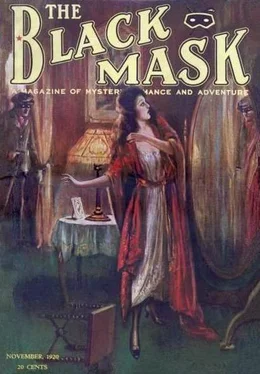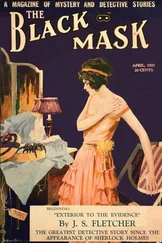Hamilton Craigie - The Black Mask Magazine (Vol. 2, No. 2 — November 1920)
Здесь есть возможность читать онлайн «Hamilton Craigie - The Black Mask Magazine (Vol. 2, No. 2 — November 1920)» весь текст электронной книги совершенно бесплатно (целиком полную версию без сокращений). В некоторых случаях можно слушать аудио, скачать через торрент в формате fb2 и присутствует краткое содержание. Город: New York, Год выпуска: 1920, Издательство: Pro-distributors Publishing Company, Жанр: Классический детектив, на английском языке. Описание произведения, (предисловие) а так же отзывы посетителей доступны на портале библиотеки ЛибКат.
- Название:The Black Mask Magazine (Vol. 2, No. 2 — November 1920)
- Автор:
- Издательство:Pro-distributors Publishing Company
- Жанр:
- Год:1920
- Город:New York
- ISBN:нет данных
- Рейтинг книги:5 / 5. Голосов: 1
-
Избранное:Добавить в избранное
- Отзывы:
-
Ваша оценка:
- 100
- 1
- 2
- 3
- 4
- 5
The Black Mask Magazine (Vol. 2, No. 2 — November 1920): краткое содержание, описание и аннотация
Предлагаем к чтению аннотацию, описание, краткое содержание или предисловие (зависит от того, что написал сам автор книги «The Black Mask Magazine (Vol. 2, No. 2 — November 1920)»). Если вы не нашли необходимую информацию о книге — напишите в комментариях, мы постараемся отыскать её.
The Black Mask Magazine (Vol. 2, No. 2 — November 1920) — читать онлайн бесплатно полную книгу (весь текст) целиком
Ниже представлен текст книги, разбитый по страницам. Система сохранения места последней прочитанной страницы, позволяет с удобством читать онлайн бесплатно книгу «The Black Mask Magazine (Vol. 2, No. 2 — November 1920)», без необходимости каждый раз заново искать на чём Вы остановились. Поставьте закладку, и сможете в любой момент перейти на страницу, на которой закончили чтение.
Интервал:
Закладка:
“Like hell!” Blumfeld grunted.
Westley smiled and looked at his watch. He stood up and pulled down his waistcoat. He placed seventy-five cents on the table to pay for the liquor he had consumed and fingered his closely shaven chin.
“Well, I’ve got to be moving. Be good to yourself and be leary of the red-necks. I’ve just got about six minutes to grab a short.”
He nodded affably and moved away. Through the front windows of the club Blumfeld saw him stride briskly across the square. The nitro-glycerine expert sat stiffly still. Ten thousand dollars! He hardly knew there was so much money in the world. And it was in the possession of a doddering inventor who lived in a mean cellar!
Blumfeld’s beady eyes glittered. When he considered the magnitude of the sum he felt dazed. For a long interval he sat with expressionless face and staring eyes. After a time he got up. He took a few steps toward the door, returned and picked up the seventy-five cents Big Harry Westley had laid on the table. He shoved it into his pocket, deciding he needed it more than the waiter.
Slouching out of the club, he descended the front steps and stepped onto the cracked pavement of Christopher Square. The late September afternoon was dying in a conflagration of sunset fire. The sky was brazen with raw scarlet, amethyst and silver-and-purple. Lights were winking in the waterfront rigging, a block distant. The river was boisterous with the voice of sirens and the shrill of whistles. The wraith of evening shook out her black draperies that were pinned with stars.
Blumfeld turned east. He walked two blocks. He came in sight of the building in the cellar of which Old Man Johnson maintained his shop. He saw the inventor’s ancient sign hanging from its metal stanchion like a one-legged acrobat. Drawing close to the areaway, Blumfeld leaned over and peered down. Somewhere in the shop below an oil lamp burned. In its uncertain radiance Blumfeld observed the stooped figure of the proprietor.
Turning to the iron stairway that led steeply down into the basement, Blumfeld drew his lips back over his teeth and smiled. He descended the steps and opened the front door. He entered and closed it after him. The shop was warm and stuffy with the odor of paint and grease. Blumfeld hardly noticed it. His quick gaze darted to the work-bench over which Old Man Johnson hung. He saw the inventor was old and feeble. The eyes of the man were blue and faded. His skin was wrinkled like yellow parchment. He wore a disreputable old pair of oil-stained trousers, a collarless flannel shirt that exposed his turkey neck and a pencil-stuffed vest held together by one button.
“You got a second hand drive shaft for a Brown and Blue taxi?” Blumfeld said, as the inventor looked up.
Old Man Johnson shook his head.
“No, I haven’t,” he said in a thin husky voice.
Blumfeld allowed his gaze to wander about the place.
“Got any gears or transmission parts?”
The inventor shook his white head again.
“No, I don’t think I have. All the parts are piled up in the corner over there. I’m going out of business, so if you find anything you can use you can have it at your own price.”
He indicated a heap of metal stacked up in one comer. Blumfeld shuffled across to it. He pawed idly over it. While he did this he plumbed the room with his beady eyes. He made a mental photograph of the way the shop was arranged, of a single window that opened on to an alley running past it, and of a door that went into what was presumably the living quarters of the inventor.
When he had observed all that interested him, Blumfeld straightened up and turned his back on the heap of metal.
“Find anything?” Old Man Johnson asked.
Blumfeld shook his head.
“No. I’ll come around next week. Maybe you’ll have a shaft picked up by then.”
The inventor smiled faintly.
“I won’t be here next week. I’m selling out. I’m going out of business. I’m leaving for Rochester on Monday. I’m an inventor and I only kept this little place here until I struck oil.”
Blumfeld allowed himself to look impressed.
“Is that right? So you struck oil. I guess that means you sold an invention. You must have knocked out large kale if you’re going to Rochester.”
The interest of his caller appeared to please the old man. He wiped his hands on a piece of cotton waste and put some tobacco in the bowl of his black pipe.
“It took me twenty years to perfect my invention,” he explained, with a touch of pride. “Many times I thought I had made it, only to discover some hidden flaw. People I told about it said it couldn’t be done and thought I was crazy to even try it. Three months ago I knew I had triumphed. I put the invention to every possible test and it made good. I applied for a patent and sent my work to a big manufacturing concern in Rochester. They tested it for two months and then agreed to purchase the right to manufacture it. They sent me ten thousand dollars and a contract. I’m going to Rochester, as I said, to take charge of the making of them.”
Blumfeld, receiving verification of Big Harry’s statement, felt satisfaction tingling keenly within him. He had almost believed that it was opium that put the words in the mouth of the big con man.
“So you got ten thousand dollars,” he murmured. “That’s a lot of money. You want to hold on to it tight. I guess you know the Square is a pretty tough place. Don’t let no one bunk the jack away from you, or stick you up for it.”
Old Man Johnson looked serious.
“Never fear, I won’t. I have it hidden where no one can find it. It’s safe.”
Blumfeld smiled.
“That’s the eye! Hang onto it. I’m sorry you ain’t got what I’m after. Good luck to you when you get to Rochester.
At the door Blumfeld stopped, seized by a sudden thought.
“By the way,” he said, “what was it you invented?”
The inventor picked up a file from the bench.
“It’s a secret,” he replied slowly. “It’s a secret until it’s put on the market—”
II
At eleven o’clock Blumfeld emerged from the east side stuss house where he had run his purloined seventy-five cents up to six dollars. A pleasant sense of success swam in his blood. His good fortune was an omen that fickle Luck smiled upon him. On such a night as this he might conquer in any deed in which he figured or any endeavor he applied his hand to.
At the comer of the street he traversed he boarded a surface car. He rode twelve blocks and transferred to a cross-town car. The second car took him as far as Harrigan Avenue, where he alighted. He continued east, treading a labyrinth of side streets that emptied like sewers along the waterfront. Where the river’s breath was damp, foul and cold, Blumfeld turned south. A few minutes later he entered Christopher Square by its west termination.
He passed the social club where he had sat and talked with Big Harry. The strains of jazz crept out through lighted windows. Evidently a dance was in progress. He wondered if it was all right to stop off for a hooker of illicit whiskey. He decided not to and quickened his step as if to outpace temptation. When the ten thousand dollars of Old Man Johnson’s was his he could buy a hundred cases of hootch. He could fill a tub full of rye and bathe in it if he so desired.
The pleasant stream of imagination he floated down emptied him into the bayou of Broken Dreams. He shook himself, as he sighted his destination. The hanging sign of the inventor loomed before him—the black areaway of the basement shop which was as dark as the inside of a pocket. Blumfeld made sure his movements were not being observed and squatted down. He looked into the shop as far as he could but saw no trace of any light.
Читать дальшеИнтервал:
Закладка:
Похожие книги на «The Black Mask Magazine (Vol. 2, No. 2 — November 1920)»
Представляем Вашему вниманию похожие книги на «The Black Mask Magazine (Vol. 2, No. 2 — November 1920)» списком для выбора. Мы отобрали схожую по названию и смыслу литературу в надежде предоставить читателям больше вариантов отыскать новые, интересные, ещё непрочитанные произведения.
Обсуждение, отзывы о книге «The Black Mask Magazine (Vol. 2, No. 2 — November 1920)» и просто собственные мнения читателей. Оставьте ваши комментарии, напишите, что Вы думаете о произведении, его смысле или главных героях. Укажите что конкретно понравилось, а что нет, и почему Вы так считаете.












